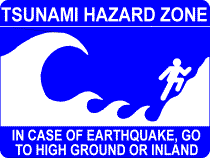|
What to Do When a Tsunami Watch Is Issued
You should:
Listen for cival defense sirens, have a plan, be prepared to act quickly.
Use a NOAA Weather Radio or stay tuned to a Coast Guard emergency frequency station, or a local radio or television station for updated emergency information. Most tsunami detection equipment is located at the coast. Seismic action may be the only advance warning before a tsunami approaches the coastline.
Check your Disaster Supplies Kit. Some supplies may need to be replaced or restocked.
Make a plan Talk with your family and household members and review evacuation plans. Make sure everyone knows there are a potential threat and the best way to safer ground. If any members of your household have special evacuation needs (small children, elderly people, or people with disabilities) consider evacuating early.
If time permits, secure unanchored objects around your home or business. Tsunami waves can sweep away loose objects. Securing these items or moving them inside will reduce potential loss or damage.
Be ready to evacuate. Being prepared will help you to move more quickly if a tsunami warning is issued.
Take care of your dependent animalsBring your companion animals indoors and be prepared with kennels or transportation plans.
Consider a precautionary evacuation of your animals, especially any large or numerous animals. Waiting until the last minute could be fatal for them and dangerous for you. Where possible, move livestock to higher ground. If you are using a horse or other trailer to evacuate your animals, move early rather than wait until it may be too late to maneuver a trailer through slow traffic.
What to Do When a Tsunami Warning Is Issued
You should:
Stay tuned
Use a NOAA Weather Radio or stay tuned to a Coast Guard emergency frequency station, or a local radio or television station for updated emergency information.
Follow instructions issued by local authorities. Recommended evacuation routes may be different from the one you planned, or you may be advised to climb higher. Remember, authorities will issue a warning only if they believe there is a real threat from tsunami.
Evacuate if necessary
If you hear an official tsunami warning or detect signs of a tsunami, evacuate at once. A tsunami warning is issued when authorities are certain that a tsunami threat exists, and there may be little time to get out.
Take your Disaster Supplies Kit. Having supplies will make you more comfortable during the evacuation.
GO TO HIGH GROUND Get to higher ground as far inland as possible. Officials cannot reliably predict either the height or local effects of tsunamis. Watching a tsunami from the beach or cliffs could put you in grave danger. If you can see the wave, you are too close to escape it.
Wait to return home
Return home only after local officials tell you it is safe. A tsunami is a series of waves that may continue for hours. Do not assume that after one wave the danger is over. The next wave may be larger than the first one. In several cases, people survived the first wave and returned to homes and businesses only to be trapped and killed by later, sometimes larger, waves in the series.
Animals tooIf you evacuate, take your animals with you. If it is not safe for you, it is not safe for your animals.
Last ResortIf you cannot escape a wave, climb onto a roof or up a tree, or grab a floating object and hang on until help arrives. Some people have survived tsunami waves by using these last-resort methods.
Learn more about Tsunami..Check out the links below
|

















